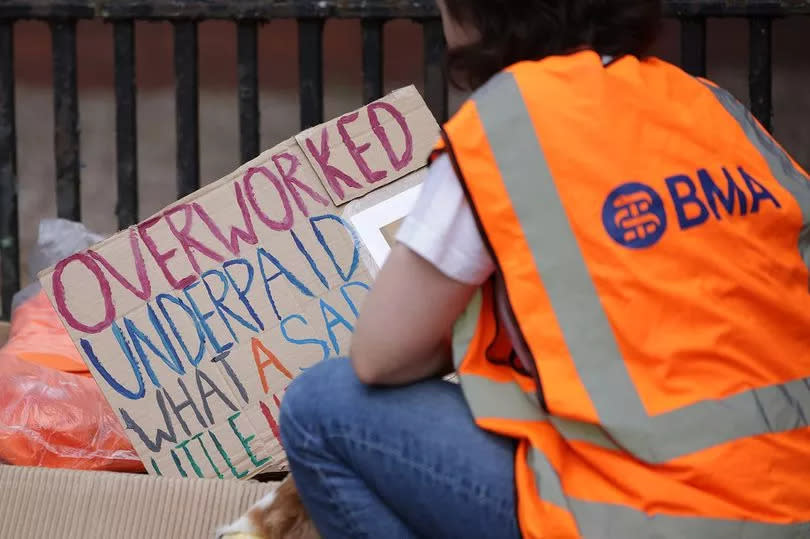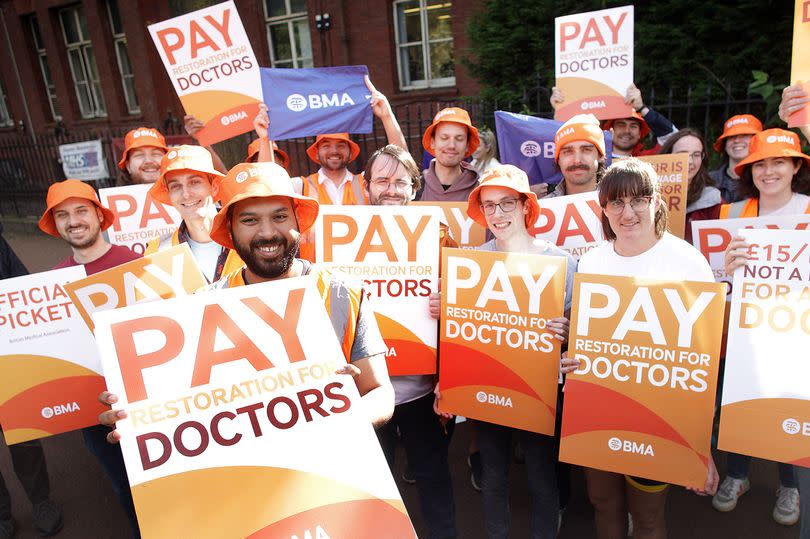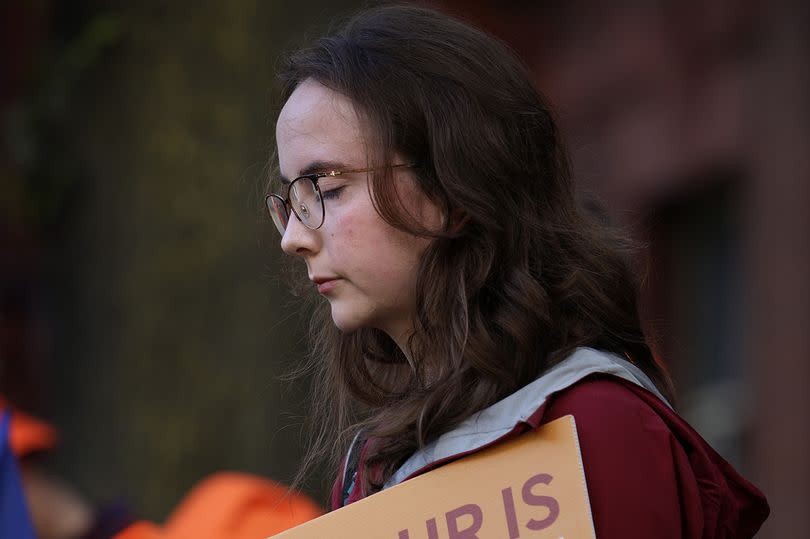'I got into this job to save lives. Now I'm having to apologise to patients waiting 20 hours in A&E'

It’s a blustery summer morning in Manchester, and the scene on Oxford Road is a typical one - students clutching books, the odd tourist, buses and cyclists roaring by. But adding to the vista today is a sea of vivid orange bucket hats outside the entrance to the Manchester Royal Infirmary – the picket line of the latest junior doctors’ strike.
It’s the first day of the nationwide strike, their 11th in 20 months, calling for pay restoration to a sector which they say has seen its pay cut by more than a quarter in real terms (i.e. not rising with inflation).
A 29-year-old resident doctor*, now training to be a GP, said: “Our pay has dropped by over 25% compared to what it was in 2008. But we’re not worth less than we were in 2008”.
READ MORE: Junior doctors in Manchester join five-day strike as general election looms
The walkout began today at 7am and will run until the morning of July 2nd, just two days before voters take to the polls in the general election on July 4th.
Emblazoned with hats, gilets and placards in an eye-catching orange, the mood among the 30-something group of medics is cheerful – but the reason they are there is a very serious one.
Each of the four medics that the M.E.N spoke to said they felt overworked and burned out, working on average 48 hours a week. They can apply to do what’s called ‘80% time’, which works out at around 37 hours – but that’s still the average full-time hours for other professions.
'9,000 doctors have applied to leave the country'
“Working in the NHS is giving people issues with their mental and physical health,” the trainee GP said. “Our pay is a barrier to any kind of action to reduce burnout.”
“Whilst we can’t improve quality of life in the UK, we can improve pay, which will lead to a better quality of life.”
The group said that, this year alone, over 9,000 doctors had applied to leave the country and work elsewhere. Low pay is at the heart of why they are striking – but beside it is the worry that the understaffing it causes is leading to a serious decline in the quality of patient care.
“When I started medical school, your average doctor would be looking after 6 to 8 patients on a ward”, said the trainee GP. “I often am now looking after 16 patients on a ward. That can’t be safe for the patients – and that’s only going to get worse as people leave.
“Being able to help patients and save lives - that’s why I got into this job. But I’m in a position now where I’m having to apologise to patients who have had to wait 20 hours to be seen in A&E.”
A 31-year-old core medical trainee said: “We’re all at the end of our tether with seeing poor patient care because of understaffing.”
“I enjoy my job - but not when I have to see a patient in a busy A&E corridor, with no privacy, knowing that I can’t get them the support they need because there isn’t a nurse around.”

Another medic, a 32-year-old anaesthetist, agreed that he felt stretched: “It’s rare to go home feeling like I’ve done enough for my patients today. You always feel like you could have done more”, he said.
Due to the nature of his job – “I can only look after one patient at a time” – he feels somewhat shielded from the pressure. “But when I sit back and look at the bigger picture and the list of patients waiting for my time, that’s devastating.”
“Every day people are seeing their operations cancelled. It’s not because of strikes, it’s because we just don’t have enough people who are trained well enough to look after people.”
They all agree that the answer is in more funding and better pay – but they feel this has not been addressed by the government, who are instead focusing on replacing the outgoing staff through the training of ‘physician associates’.
“These people are not trained to the same standard – they don’t necessarily have a medical degree”, said the trainee GP. “But they are still being pushed to make everything look better.
“It’s not better. If you paint over the cracks, the cracks are still there.”
Another complaint is lack of jobs. Despite the high demand for GP appointments, the doctors themselves are struggling to find work. “Their surgeries are shutting down, and if you look at the numbers, there are fewer GPs doing more work”, the anaesthetist said.
“There are fully trained GPs working as Uber drivers or on the Tesco checkouts because they can’t get a job.”

Currently, a junior doctor in their first year, having completed at least 5 years of medical school, will receive a basic salary of £32,397. While this is higher than the median average salary in the UK (£29,669 in 2023 according to the ONS), it works out at £15.52 an hour. For comparison, legal minimum wage in the UK is £11.44 per hour.
One medic, a 25-year-old in the first year of her foundation training (F1), said: “As someone who’s just started, it’s hard coming in and seeing how it’s been for everyone senior to me – and knowing that’s my future.”
“I’ll be working as a junior doctor for years and it feels like the experience that I’ll gain isn’t really reflected in the pay. I think a lot of the NHS is running on people’s good will - on people working harder than what they’re compensated for.”
Burnout, mental health issues and despair
It seems that the NHS is at least aware of the pressures its staff are facing: the F1 doctor said she has been to 6 sessions of ‘resilience training’ this year alone. “It’s all aimed at us taking responsibility for our wellbeing – meditation, sleep hygiene,” she said.
“All those things are great – but what we really feel would help us is the more external stuff, the issues with the system. That’s what makes us all burnt out and stressed.
“The training isn’t going to make the impact to our mental health that changing the system would. And I think they know that.”
The trainee GP thinks the support from above has been negligible. “It shouldn’t be that we have to have news stories about burnout and junior doctor suicides every year without any kind of resolution beyond, ‘Have you considered improving your own well-being?’
“If you’re in a building that’s on fire, you don’t want the fire brigade to say, have you considered putting it out yourself?”
The group of medics say they have seen lots of supportive reaction to their picket that morning: passing motorists beeping their horns and passers-by approaching them to offer their support.

“The most important support we’ve had is from patients”, said the anaesthetist. “Coming up to us, saying ‘I’ve had things cancelled, but that’s OK, ‘cause it’s part of the bigger picture’. People understand that – it’s for the patients in the end.
“Not to say it’s not for ourselves too – but the patients are in the end what we work for and why we’re here.”
The trainee GP agrees. “It is one of the few things that is protective against burnout – patients saying that they are supportive of us.”
“A thankyou card is such a blessing – everyone gets so excited if you get one. It’s such a small thing, but it makes such a big difference to me”, said the anaesthetist.
“I’ve had days where I’ve been so stressed, and then a patient or their family member will come up to me and say thank you, and it almost brought me to tears,” said the F1 doctor. “Because I’m just so tired and stressed and it means so much.”
*The doctors striking wished to remain anonymous.

 Yahoo News
Yahoo News 
